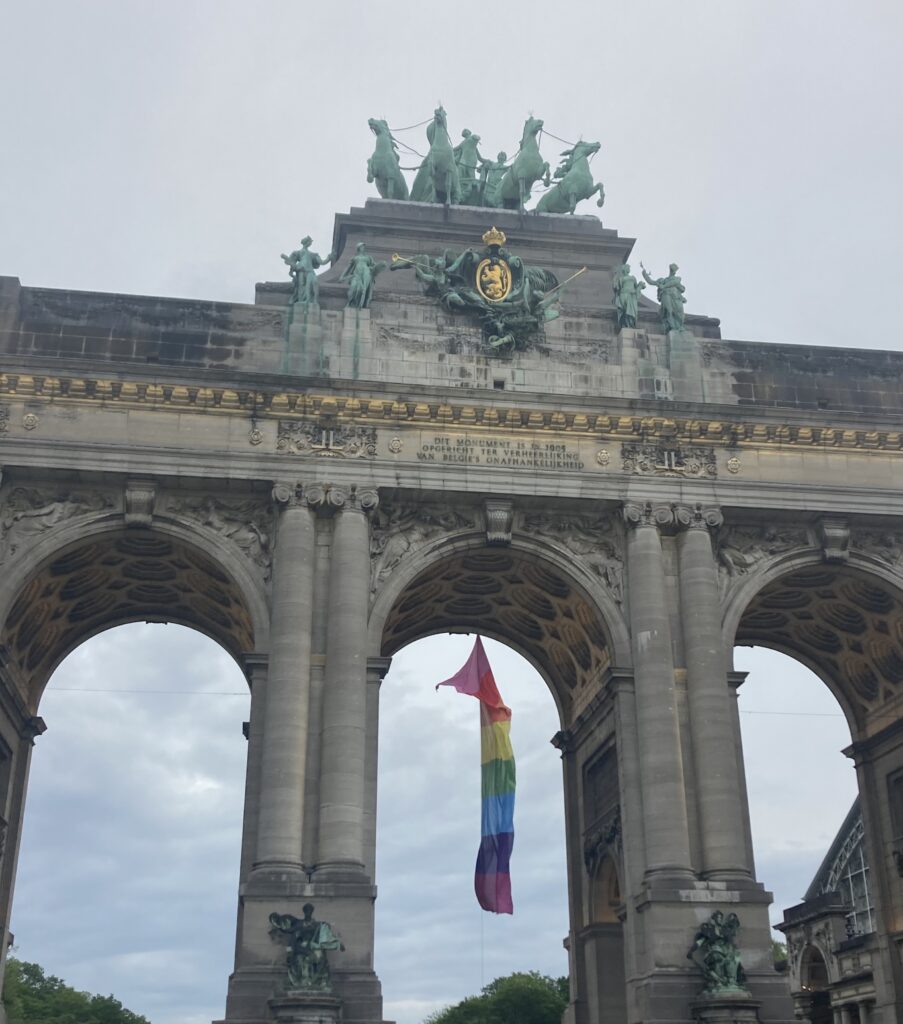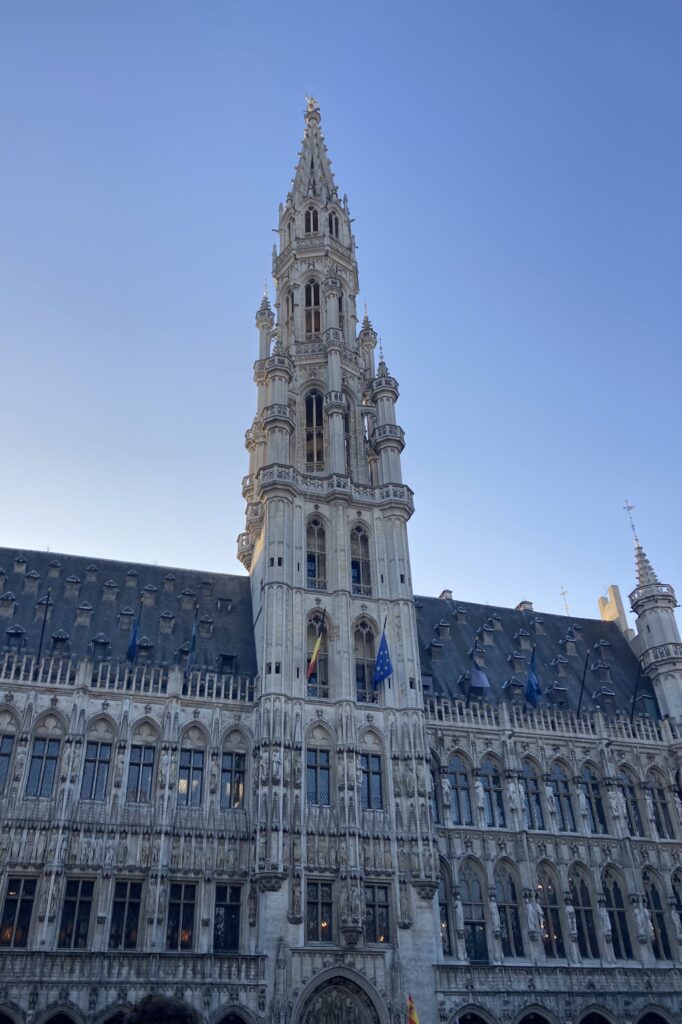As a Fulbright Schuman grant recipient in Brussels, Isobel Williamson spent the 2023-24 academic year conducting LGBTQ+ rights policy research with the Université Libre de Bruxelles. Her research explores the lived experiences of LGBTQ+ Central and Eastern European migrants in Brussels to identify new avenues for the EU’s institutions to advocate for LGBTQ+ rights across the Union. She graduated from the University of Washington in 2022 with an International Studies major and a French minor.
Q: Briefly describe your grant project.
My grant project focuses on the geopolitics of the EU’s internal LGBTQ+ rights promotion. I’m using Belgium and Poland as case studies to debunk myths that are reinforced by popularly held framings of the EU’s LGBTQ+ rights promotion. I’m interviewing LGBTQ+ Polish migrants to Brussels, as Poland and Brussels are framed as opposite sides of the internal geopolitical LGBTQ+ rights clash. Through highlighting the experiences of people with proximity to both places, I aim to debunk the myth that LGBTQ+ rights only travel from west to east within the EU. I’m also exploring how the EU frames its LGBTQ+ rights interventions in relation to Central and Eastern Europe, and how Polish LGBTQ+ activists frame their work in relation to the EU. In doing so, my intention is to identify how the EU can minimize backlash resulting from its internal LGBTQ+ rights interventions and best support grassroots activism throughout the union.

Q: In what way is your specific field of research relevant to the transatlantic relationship?
The USA and the EU both have exerted considerable effort to incorporate LGBTQ+ rights into their collective identities and foreign policies. At the same time, there is a significant LGBTQ+ rights backslide taking place both within the US and the EU. This project speaks to the importance of international LGBTQ+ rights solidarity and how we can only push for sustainable progress by uniting as a global community and seeing our struggles as intertwined. Despite language and cultural barriers, I’ve been able to connect with many LGBTQ+ individuals over our shared membership in this community. Many people I’ve talked to, for instance, have heard about the anti-LGBTQ+ bills being passed in the USA, and talking to a queer American has given them additional perspective on this issue and helped them see similarities between LGBTQ+ rights activism and resistance in the US and the EU.
Q: How did you initially learn about the Fulbright Schuman Program, and what motivated you to apply? How did you end up picking Belgium and Poland as your host countries?
I learned about the Fulbright Schuman Program through a former advisor at the University of Washington. I was motivated to apply because I had written a thesis on the LGBTQ+ rights backslide in Poland, and the impact of the EU’s budgetary intervention on human rights in southeastern Poland following ‘LGBT-free’ zone doctrines. This project left me very curious about how the EU can best support LGBTQ+ rights in light of backsliding throughout the union and the perceived geopolitical LGBTQ+ rights clash. I chose to base my project in Brussels due to proximity to EU institutions and how Belgium’s national identity heavily incorporates LGBTQ+ rights. Brussels also has a very visible LGBTQ+ community, and is a popular destination for migrants across the EU. At the same time, LGBTQ+ migration to Brussels is an under-studied discipline. I selected Poland because the EU intervened several times in Poland in recent years due to LGBTQ+ rights backsliding, and because the LGBTQ+ rights backlash in Poland was a factor that prompted the EU to connect its identity even more closely to LGBTQ+ rights.
Q: You wound up spending the majority of your grant in the “capital” of the European Union: Brussels. Was life in Belgium what you expected?
I expected life in Brussels to be very fast-paced, and was pleasantly surprised by how relaxed the city feels. A major cultural difference is the work-life balance here; I seldom see colleagues in the office after 5 pm sharp, and taking long lunch breaks and other breaks throughout the day is viewed as something that helps, rather than hinders, productivity. Another major difference is that, amongst younger people I’ve met in Brussels, there is much less of a car culture compared to in the USA, and public transit is quite accessible. Given how small of a country Belgium is, it’s easy to travel across the country in a matter of hours, making it easy and accessible to visit different cities by train.

Q: In what ways have you engaged with your host community in Belgium?
I volunteer with the RainbowHouse, an LGBTQ+ organization in Brussels which serves as a safe space and community center. I have also joined a dinner club, where a group of locals and expats host themed potluck dinner parties. Finally, I have joined a writer’s group and participated in a French-English language exchange. Overall, I’ve found that these activities have helped me leave my comfort zone, connect with locals and expats from all across the world, and have helped make Brussels feel like home.
Q: What has been your favorite “discovery” in your host country?
Liège waffles (which contain small pieces of caramelized sugar) are one of my new favorite foods! As well, before coming on this grant, I staunchly disliked beer – but there are so many varieties in Belgium that I’ve started enjoying some!
Q: Can you tell us the story of a particular memorable moment(s) from your time in Brussels?
I’ve had some particularly interesting conversations where I’ve debunked myths related to the USA. For example, I’ve talked to some people who have mostly been exposed to the U.S. through popular media and have a very specific vision of what the country looks like due to these portrayals. I’ve discussed aspects and initiatives in the U.S. that are less covered in international media, for example, Indigenous cultures and languages, student activism, differences between regional cultures, and innovations that are taking place. I’ve found that these conversations resulted in a more nuanced view of the US and appreciation of the movements working to change the country for the better.
Q: The Fulbright Schuman Program is all about increasing mutual understanding between the United States of America and the European Union. What misconceptions do you think other Americans may have about the EU? To what extent has your own understanding of the EU and European identity changed during your time here?
When I would explain to other Americans that I was moving to Belgium before I started my grant, I noticed that many have a very idealistic view of the EU, with many citing the stronger social safety net and how progressive many EU Member States are. I think it is important that Americans acknowledge that the EU isn’t a monolith of progressive policies, and is facing many challenges. On this grant, I’ve gained a greater understanding of just how multifaceted European identity is. I’ve also learned more about how individuals may identify primarily as their nationality or as European for a huge variety of reasons. In many ways, this grant has also helped me see parallels between the US and the EU – for example, American identity encapsulates so many different regions and cultures, it is very challenging to pinpoint a singular definition of what it means to be American.
Q: What advice would you give to someone who is considering applying to the Fulbright Program?
The Fulbright Program offers so many opportunities for personal and professional growth and I absolutely recommend applying! I’ve really enjoyed my research, and I’ve also found a major perk of the program has been the opportunities to engage with other grantees, locals, and expats outside of work. If you are in college or a recent graduate, I think that there can be a lot of pressure to immediately jump into a long-term 9-5 job, but the Fulbright Program is such a great opportunity to leave your comfort zone, learn about a new culture, and gain skills that will be applicable to whichever career you choose.
